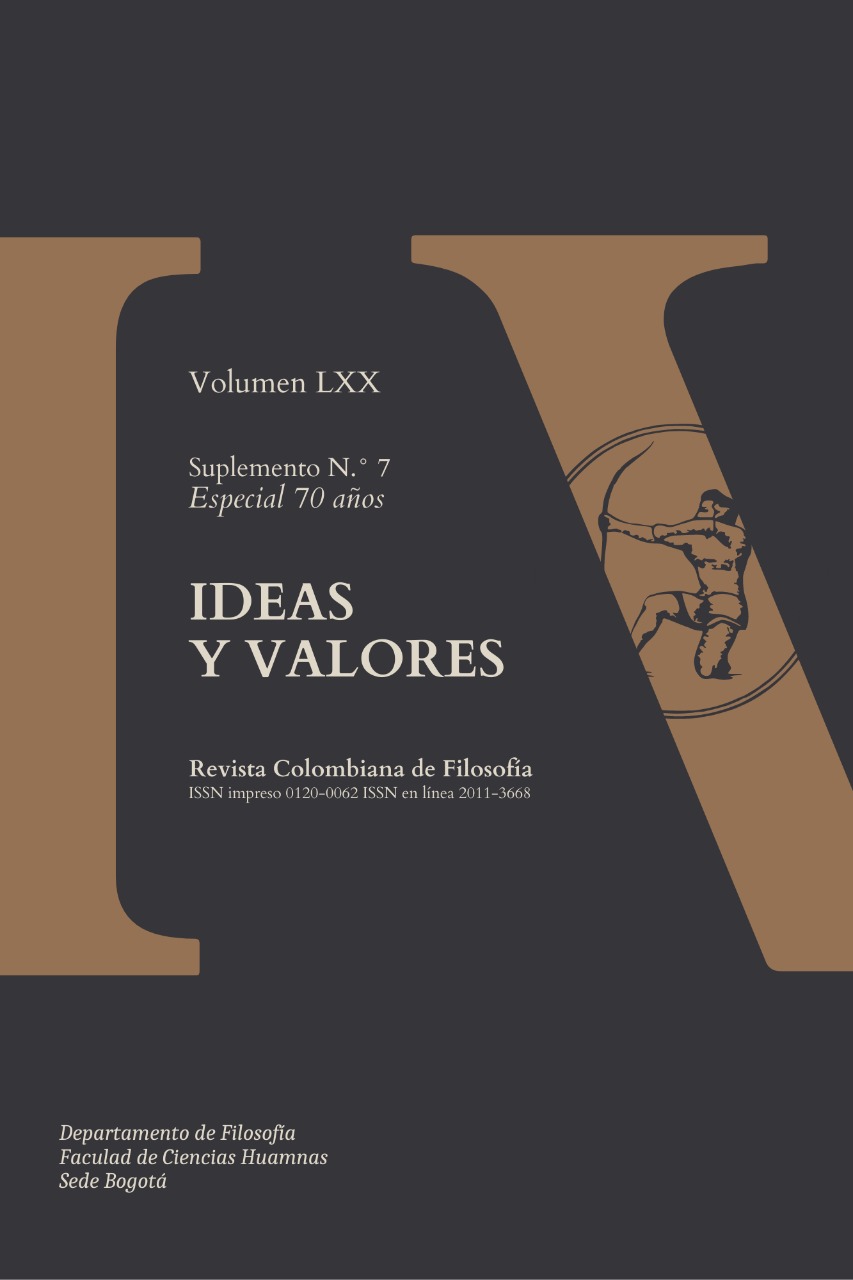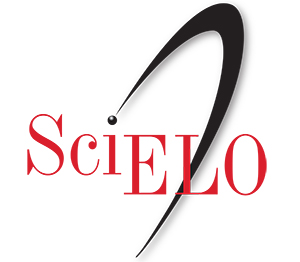La praecisio mundi. La medición de la ciencia y el recorte de la universidad como proyecto cultural
The praecisio mundi. The Measurement of Science and the curtailment the University as a Cultural Project
DOI:
https://doi.org/10.15446/ideasyvalores.v70n7Supl.95962Keywords:
Bibliometría crítica, Ciencia modo 2, Postontología, Productivismo académico (es)Bibliometrics, Measuring science, Productivism, Criticism (en)
Downloads
Este ensayo plantea una cuestión filosófica perseguida como investigación histórica que desemboca en una explicación sociológica en torno a la medición de la ciencia. Medir, etimológicamente relacionado con una praecisio (un recorte, una mutilación) adquiere su sentido más profundo en una era postontológica para describir las implicaciones culturales de un mundo privado de metafísica. Basado en un relato sucinto del surgimiento del pensamiento bibliométrico enmarcado por el debate historiográfico de principios del siglo XX entre historiadores seriales e historiadores del evento (histoire événementielle), este ensayo une tanto el significado postontológico como la evidencia histórica en un análisis sociológico de la ciencia y políticas tecnológicas en la Colombia del cambio de siglo que conlleva una transformación
radical de la universidad como institución social, del estatus del conocimiento en la sociedad contemporánea y de la identidad de nosotros los académicos que habitamos ese espacio.
This essay poses a philosophical question conducted as an historical investigation that end up in a sociological explanation around the measurement of science. Measuring, etymologically related to a praecisio (a closure, a mutilation) acquires its deepest meaning in a postontological era for describing the cultural implications of a world deprived of metaphysics. Based on a succinct ac-
count of the emergence of bibliometric thought framed by the early-twentieth-century historiographic debate between serial historians and historians of the event (histoire événementielle), this essay join both postontological meaning and historical evidence into a sociological analysis of science and technology policies at the turn of the century Colombia which have led to a radical transformation of the university as a social institution, of the status of knowledge in contemporary society, and the identity of we scholars who inhabit that space.
References
Arias, P. M. “El promedio de publicación de un científico es 10 artículos por año.” El Espectador. 25 Octubre 2013. A1.
Bell, D. El advenimiento de la sociedad postindustrial Madrid: Alianza Editorial, 1976.
Durkheim, E. Las reglas del método sociológico y otros ensayos de metodología. México: Fondo de Cultura Económica, 2019.
Fleck, L. Genesis and Development of a Scientific Fact. Chicago: The University of Chicago Press, 1981. DOI: https://doi.org/10.7208/chicago/9780226190341.001.0001
Gibbs, W. W. “Lost Science in the Third World.” Scientific American 273 (1995): 76-83. DOI: https://doi.org/10.1038/scientificamerican0895-92
Gibbons, M., Limoges, C., Nowotny, H., Scott, P., Schwartzman, S. and Trow, M. The New Production of Knowledge: The Dynamics of Science and Research in Contemporary Societies. Londres: Sage publications: 1995.
Gómez-Morales, Y. J., Anduckia, J. C. y Rincón, N. “Publicaciones seriadas científicascolombianas.” Interciencia 23.4 (1998): 208-217.
Gómez-Morales, Y. J. “Revisiting the ‘heroic’ age: from externalism to internalism in serial history of science.” 11th international conference of the international society for scientometrics and informetrics. Consejo Superior de Investigaciones Científicas. Madrid, España. 25 al 27 de junio 2007. Conferencia.
Gómez-Morales, Y. J. “Reporte Publindex Alternativo.” Colciencias. Bogotá: Ministerio de educación, 2017.
Gómez-Morales, Y. J. “Abuso de las medidas y medidas abusivas. Crítica al pensamiento bibliométrico hegemónico.” Anuario Colombiano de Historia Social y de la Cultura 45.1 (2018): 269-290. DOI: https://doi.org/10.15446/achsc.v45n1.67559
Gross, P. L. K. y Gross, E. M. “College Libraries and Chemical Education.” Science 66 (1927): 385-389. DOI: https://doi.org/10.1126/science.66.1713.385
Hess, D. J. Science Studies an advance introduction. New York and London: New York University Press, 1997.
Hulme, E. W. Statistical Bibliography in Relation to the Growth of Modern Civilization. London: Butler & Tanner, 1923.
Janke, W. Postontología. Bogotá: Pontificia Universidad Javeriana, 1988.
Kuhn, T. The Structure of Scientific Revolutions. Chicago: The University of Chicago Press, 1970.
Kreimer, P. “Internacionalización y tensiones para un uso social.” Proyecto Ensamblado en Colombia: Ensamblando Estados. Ed. Olga Restrepo Forero. Bogotá: Universidad Nacional de Colombia (Centro de Estudios Sociales), 2013. 437-452.
De Solla Price, D. J. “Quantitative Measures of the Development of Science.” Archives Internationales d’Histoire des Sciences 14 (1951): 85-93.
De Solla Price, D. J. “The Science of Science.” The Science of Science. Society in the Technological Age. Eds. Maurice Goldsmith y Alan Mackay. London: Souvenir Press, 1964.
Rainoff, T. J. “Wave-like Fluctuations of Creative Productivity in the Development of West-European Physics in the Eighteenth and Nineteenth Centuries.” Isis 12 (1929): 287-319. DOI: https://doi.org/10.1086/346411
Shenhav, Y. “Science in LDCs: Connectedness versus Universalism.” Science and Technology Studies 5.3 (1987): 124-125.
Shenhav, Y. y Kamens, D. H. “The ‘Costs’ of Institutional Isomorphism: Science in Non-Western Countries.” Social Studies of Science 21.3 (1991): 527-545. DOI: https://doi.org/10.1177/030631291021003005
Wilson, P. W. y Fred, E. B. “The Growth Curve of a Scientific Literature.” The Scientific Monthly 21 (1935): 240-250.
How to Cite
MODERN-LANGUAGE-ASSOCIATION
ACM
ACS
APA
ABNT
Chicago
Harvard
IEEE
Turabian
Vancouver
Download Citation
License
Copyright (c) 2021 Los derechos son del autor(es), quien(es) puede re-publicar en parte o en su totalidad el documento ya publicado en la revista siempre y cuando se dé el debido reconocimiento a Ideas y Valores

This work is licensed under a Creative Commons Attribution-NonCommercial-NoDerivatives 4.0 International License.
The Creative Commons Attribution-NonComnercial-No Derivatives 4.0 Internacional License authorizes copying and redistributing the material in any means or format, provided that credit is granted to the authors and to Ideas y Valores as the source of the original publication. Copying or distributing the contents of the journal for commercial purposes is not allowed; neither is the adaptation, derivation, or transformation of the contents, without previous authorization by the authors and the editors of Ideas y Valores. For further information regarding the terms of this license, please consult http://creativecommons.org/licenses/by-nc-nd/4.0/legalcode.








1.jpg)
.png)


1.png)
.png)
.png)
.jpg)

.png)









